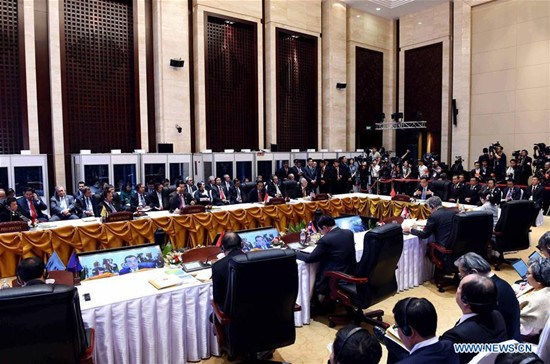
Chinese Premier Li Keqiang attends the 19th summit between China and the Association of Southeast Asian Nations (ASEAN) to commemorate the 25th Anniversary of China-ASEAN Dialogue Relations, in Vientiane, Laos, Sept. 7, 2016. (Xinhua/Rao Aimin)
As leaders from the the Association of the Southeast Asian Nations (ASEAN) member states gather in the Lao capital of Vientiane for a summit this week, regional cooperation and development is high on their agenda.[Special coverage]
Facing with the anemic economic landscape and growing anti-globalization sentiment in parts of the world, analysts in Southeast Asia stress the importance of closer regional integration for the growth prospect, and expect China to play a positive and significant role.
Common Challenges
In his keynote address, Lao President Bounnhang Vorachith, whose country holds the ASEAN chairmanship this year, identified the challenges faced by the region.
"Regional and international environments have undergone rapid and complex challenges," he told leaders of his fellow ASEAN countries. "Although the global economy has gradually recovered, growth remains slow and fragile."
He urged ASEAN to enhance cooperation and collaboration with its dialogue partners and the larger international community "in order to be able to respond to and address the said challenges in a timely manner."
The weak global economic growth was aggregated by an emerging anti-globalization sentiment, notably in the Western countries, said Wang Jiangyu, associate professor at National University of Singapore.
The trend was caused by the imbalance in distribution as well as the lack of solution to the internal income gap and the failure to compensate those lose out in globalization in major economies, Wang told Xinhua.
It may lead to capital and industries reflow to the advanced economies, draining the benefit of globalization from Asia, he said.
"The best solution is to return to the prospect of Asian integration," he said. "Asian countries may come to realize the necessity to speed up the integration and to build a common market."
Those countries which have pin their hope on the U.S. -led Trans-Pacific Partnership (TPP) are caught in a quandary as the trade pact may be blocked or shelved due to the rising populism and anti-globalization sentiment in the United State, Wang added.
Wang said China could uphold the regional economic integration by playing a leading role in free trade negotiation, including the Regional Comprehensive Economic Partnership (RCEP), and to build a common Asian market by reducing trade barriers and facilitating free movement of goods, services, capitals and people.
"This will be something that could benefit the future," he said.
Oh Ei Sun, a senior fellow with S. Rajaratnam School of Singapore Nanyang Technological University, said ASEAN countries hope the momentum of China's economic growth would boost regional development, therefore create the great opportunities for China-ASEAN cooperation.


















































